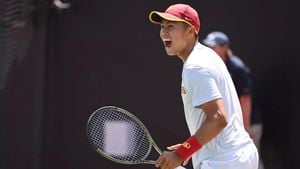South Korean universities have recently made headlines by achieving unprecedented success, with several nursing programs announcing 100% accreditation rates for their graduates. Among these institutions, Kyungdong University and Jeonju University stand out as exemplary models of educational excellence.
On February 25, 2025, Kyungdong University, located in Wonju, reported a remarkable achievement where five out of eight departments within its Medical Campus recorded 100% pass rates on the national nursing qualification exam. This included 362 graduates from its nursing program, all of whom successfully obtained their nursing licenses. Notably, this is the second consecutive year for their nursing program to attain this milestone, solidifying its reputation as one of the leading nursing education providers within South Korea.
"Kyungdong University has achieved nationwide top employment rates for graduates for six consecutive years, rooted in our significantly high national exam pass rates," said Han Jiwoo, Acting Dean of Nursing. The dean credited this success to the rigorous support and high-quality education provided by the faculty, alongside the exceptional efforts put forth by the students themselves.
Jeonju University, known for its strong commitment to nursing education, also shared commendable accomplishments. The university announced on the same day—February 25—that all 66 graduates from its nursing program had passed the national licensure examination. According to Kim Hyun-young, the department head at Jeonju, "Our success in the national nursing exam is the result of systematically implementing performance-based curricula and quality education," underscoring the university's dedication to maintaining high educational standards.
These impressive results have not only garnered attention for the institutions but have also raised the bar for other universities nationwide. With the national average employment rate for graduates hovering at around 64.6%, Kyungdong University, for example, recorded significantly higher rates—80%—among its own graduates, showcasing the effectiveness of their educational approach.
Such results prompt consideration of what makes Kyungdong University and Jeonju University leaders in the field. Their success stems from innovative curricula focusing on real-world applications, strong mentorship programs, and comprehensive student support systems. This ought to encourage other institutions aiming to improve their own educational outcomes, particularly within the nursing field.
Beyond conventional education, these universities are also adopting new strategies to maintain their competitive edge. Kyungdong University recently revealed its plans to also offer teacher qualification programs starting from the 2024 academic year, indicating its commitment to diversifying educational opportunities for its students.
The acknowledgment of educational standards through such achievements is not just about recognition; it signals to prospective students and parents about the quality of education and future job security. Many graduates from both universities are already securing positions within prestigious medical institutions, including Seoul National University Hospital and others throughout the region.
Higher education institutions across South Korea could look to Kyungdong and Jeonju as illustrative examples of how rigorous adherence to quality and performance-based outcomes can lead to unprecedented accreditation results. Not only are these successful programs uplifting individual students, but they are also enhancing the overall perception of nursing as a career, inviting talented individuals to pursue this noble profession.
Both institutions continue to adapt and evolve, reinforcing the need for educational frameworks to embrace innovation, performance evaluation, and practical skills training. Their ability to provide to the changing demands of health care can set the tone for future educational policies across the country.
This collective success reflects the broader potential within South Korean higher education to achieve substantial outcomes when institutions commit fully to their mission of preparing competitive, employable graduates ready to serve their communities with excellence. The achievements of both Kyungdong and Jeonju symbolize not only individual accomplishments but also serve as beacons of hope for nursing education across the nation.



